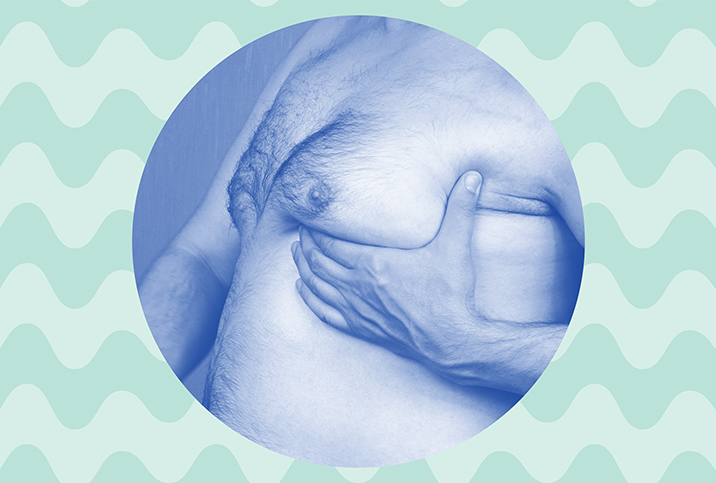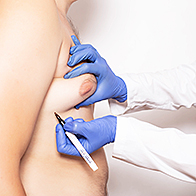The Direct and Indirect Ways Gynecomastia Is Tied to Erectile Dysfunction

For men, living with enlarged breasts can be difficult. Perhaps even more difficult when, in addition to dealing with the presence of conspicuous breast tissue, a guy may have erectile dysfunction (ED).
About three times per week at his practice, Michael Zahalsky, M.D., sees men who are struggling with both ED and gynecomastia, or breast tissue formation.
"This happens to tons of people," said Zahalsky, a board-certified urologist specializing in sexual dysfunction and founder of Z Urology in South Florida's Broward County.
Some men might see a urologist for their ED only to discover they have gynecomastia, too. If a man has a lot of body fat overall, fat can accumulate in the breast or chest area. But true gynecomastia involves the development of actual breast tissue, Zahalsky said.
Gynecomastia, the glandular proliferation of breast tissue in a man, should be distinguished from pseudogynecomastia, which is proliferation of fatty breast tissue in a man, said Jeremy Choy, M.D., an assistant professor of urology at the University of Washington School of Medicine. He added that the latter often masquerades as the former until a patient is formally evaluated.
Hormonal factors in gynecomastia and erectile dysfunction
Gynecomastia and ED tend to be multifactorial, Choy said, meaning they can be caused by varied and often intersecting factors. Hypogonadism, a gonadal deficiency that leads to inadequate levels of testosterone, can be common to both conditions. If a man develops gynecomastia because of his hypogonadism, the low testosterone levels would make him more prone to ED.
Zahalsky said it's known that hormone levels and ED correlate, but they don't correlate in a simple fashion. Even though a high testosterone count might provide some men with a misplaced sense of confidence, it's too simplistic to assume better erections stem from higher levels of testosterone, he suggested.
"In the case of ED, adequate testosterone levels are needed to promote erectile function, so testosterone deficiency can manifest in poor erection quality," Choy explained. "Gynecomastia, on the other hand, arises from an imbalance between testosterone and estrogen. When testosterone levels are low, that balance swings in favor of the estrogen, which can give rise to the gynecomastia."
Zahalsky echoed Choy in that regard and emphasized the importance of estrogen.
"Breast tissue forms from a variety of things, but one of the things is an increased amount of estrogen in your body," Zahalsky said.
Obese men might suffer from ED and gynecomastia for reasons related to aromatase and estradiol.
'When testosterone levels are low, [hormonal] balance swings in favor of the estrogen.'
"There's a hormone in fat cells called aromatase, and aromatase converts testosterone to what's called estradiol, which is a form of estrogen," Zahalsky said. "So just because you have a good testosterone level doesn't mean that your estrogen levels aren't elevated."
When boys hit puberty and experience a surge in testosterone, they can also experience a surge in estrogen, because in select cases, aromatase converts the excess testosterone into estradiol, and then the excess estrogen causes certain adolescent males to develop gynecomastia, Zahalsky explained.
Undoubtedly, gynecomastia and sexual dysfunction can and do coexist. However, men who develop breasts and ED might have normal hormone profiles.
"You can have normal hormone profiles but still have an abnormal testosterone-to-estradiol ratio," Zahalsky said.
Psychological causes of erectile dysfunction
Psychogenic ED, which is driven by anxiety, stress, pressure and similar feelings, is one of the most common forms of sexual dysfunction, especially for men in their 20s and 30s, according to Choy.
"If a man is feeling self-conscious or anxious, this can certainly lead to erectile dysfunction, even if he is otherwise physically healthy," he explained.
A number of women deal with body dysmorphic disorder (BDD), but Zahalsky believes a comparable number of men also may have some form of BDD, only it revolves around the genitals much of the time. Women see the prominent, perky breasts of other women virtually everywhere, from television to Instagram to advertisements, but men encounter points of bodily comparison in specific contexts that can contribute to psychological problems, Zahalsky said.
"The majority of time that men are seeing penises is [when] they're watching porn, and these guys have these huge penises," Zahalsky said. "They last for a really long time."
Feelings of inferiority and insecurity can arise from watching porn. But even having difficulty with getting an erection once, maybe as a result of initial insecurities with a woman or the effects of alcohol, can contribute to lingering self-consciousness that creeps in the next time a guy gets ready to have sex. This insecurity can leave his phallus flaccid again, making him more susceptible to subsequent ED.
Gynecomastia could exacerbate these psycho-emotional struggles, making a man insecure about taking his shirt off for sex and showing his chest, which can in turn make it difficult to get and stay hard. If a guy compensates for an absence of sexual pleasure with food or alcohol, he might gain weight, and the added fat could perpetuate the vicious cycle.
Treatments for gynecomastia and erectile dysfunction
If hypogonadism is the cause of both ED and gynecomastia, Choy said testosterone replacement therapy (TRT) can help treat them.
"If a man has ED for other reasons—poor blood flow, poor nerve function, medication-related effects or psychogenic reasons—then testosterone treatment is unlikely to make it better," he noted. "And if a man has gynecomastia for other reasons, then testosterone treatment can actually make the gynecomastia worse."
Indeed, excess testosterone—either produced by the body or obtained from external sources—can get converted into estrogen, causing estrogen levels to rise and, in some cases, breast tissue to form.
Zahalsky said that although there is little research on the subject, he's come to believe a man's testosterone-to-estradiol ratio is more important than his testosterone level in relation to ED and gynecomastia. However, not every study supports the relevance of estradiol in diagnosing ED.
Gynecomastia usually improves when you prevent the conversion of testosterone into estrogen, and Zahalsky contends that sexual function can also often improve with those preventive measures.
"In my practice—we do a lot of hormone replacement here—we do tend to give people that are on hormone supplements also anti-estrogen, because that will allow them to take less hormone supplementation," he said. "In other words, if you have a bunch of guys on testosterone therapy, you don't need to take as much testosterone therapy if you can limit the conversion of the testosterone to estrogen."
Limiting that conversion ought to increase levels of testosterone, keep estrogen levels lower and engender enhanced sexual function.
Research has yet to properly explore whether giving an aromatase inhibitor to men who suffer from both gynecomastia and ED helps address both conditions, Zahalsky said.
Medical, surgical and even radiological treatments for gynecomastia are also available. Zahalsky stressed that gynecomastia often goes away on its own, however, and encouraged men not to let the condition affect their enjoyment of sex, sexuality and intimacy.
Don't rush to unnecessary treatment
Given the interconnected aspects of excess weight, breast tissue formation and sexual dysfunction, men who experience any combination can find themselves excluded—perhaps unfairly, perhaps by self-imposition—from other experiences of erotic connection and sexual pleasure.
Communication, therefore, becomes essential, Choy said.
"It is important for men to maintain an active dialogue with their partners regarding their feelings and concerns regarding their bodies in order to achieve a level of comfort and intimacy that helps to alleviate performance anxiety and promote both emotional and physical connection," he said.
Likewise, the many pathophysiologic complexities governing the processes of ED are reason enough for Choy to wax circumspect.
"I would encourage men who are experiencing them to seek professional evaluation from a men's health specialist, or endocrinologist in the case of gynecomastia, as pursuing treatment without a clear understanding of the underlying cause can prove to be ineffective or even harmful," he concluded.




















